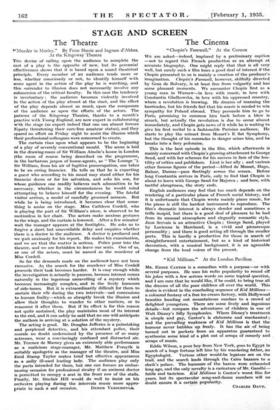STAGE AND SCREEN The Theatre
?"Murder in Motley." By Fenn Sherie and Ingram d'Abbes. At the Kingsway Theatre THE device of calling upon the audience to complete the cast of a play is the opposite of new, but its perennial effectiveness shows that it is based upon a sound theatrical principle. Every member of an audience tends more or less, whether consciously or not, to identify himself with some agent in the action of the play he is watching, and this surrender to illusion does not necessarily involve any submersion of the critical faculty. In this case the tendency is involuntary ; the audience becomes violently involved in the action of the play almost at the start, and the effect of the play depends almost as much, upon the composure of the audience as upon the efforts of the actors. The patrons of the Kingsway Theatre, thanks to a month's practice with Young England, are now expert in collaborating with the stage (so expert indeed that one can almost foresee Equity threatening their care-free amateur status), and they spared no effort on Friday night to assist the illusion which their professional colleagues were concerned to create.
The curtain rises upon what appears to be the beginning
of a play of severely conventional mould. The scene is laid in the drawing-room of Sir William Ainslie's house in London (the room of course being described on the programme, in the barbarous jargon of house-agents, as " The Lounge "). Sir William, from his air of fugitive preoccupation, one takes to be an erring financier. He tells us that he is expecting a guest who according to his mood may stand either for his financial doom or for his salvation, and asks his son, for whose guidance one readily believes such admonition to be necessary, whether in the circumstances he would mind attempting to behave himself for the evening. The fateful visitor arrives, a model of carefully groomed nemesis. But while he is being introduced, it becomes clear that some- thing is amiss on the stage. Miss Cathleen Cordell, who is playing the part of Sir William's niece, is observed to be motionless in her chair. The actors make anxious gestures to the wings, and the curtain is lowered. After a few minutes' wait the manager appears at the footlights. He asks us to forgive a short but unavoidable delay and enquires whether there is a doctor in the audience. A doctor is produced and we wait anxiously for his report. He makes his examination, and we see that the matter is serious. Police pour into the theatre, and we are forbidden to leave our seats. One of us, or one of the actors, must be named as the murderer of Miss Cordell.
So fax the demands made on the audience have not been
excessive. As the search for the murderer of Miss Cordell proceeds theirs task becomes harder. It is easy enough while the investigation is actually in process, because interest comes naturally in the ingenious unravelling of a mystery which becomes increasingly complex, and in the lively humours of side-issues. But it is extraordinarily difficult for them to sustain their role during the two intervals—sad concessions to human frailtywhich so abruptly break the illusion and allow their thoughts to wander to other matters, or to reassume it after them. But if its effect is for this reason not quite sustained, the play maintains most of its interest to the end, and it can safely be said that no one will anticipate the authors in arriving at a solution of the mystery.
The acting is good. Mr. Douglas Jefferies is a painstaking
and perplexed detective, and his attendant police, their morale no doubt undermined by the presence of so many actresses, wear a convincingly confused and distracted air. Mr. Terence de Marney gives an extremely able performance as a malicious stage-manager, Mr. Matthew Forsyth is suitably apologetic as the manager of the theatre, and Miss Enid Stamp Taylor makes brief but effective appearances as a sadly ill-used leading lady. The audience play only the parts intended for them, but one can foresee an embar- rassing occasion for professional rivalry if an eminent doctor is permitted to occupy a seat in the front row of the stalls. Finally, Mr. Sinclair Hill would do well to insist on his orchestra playing during the intervals music more appro- priate to such a sad occasion. DEREK VERSCHOYLE.














































 Previous page
Previous page